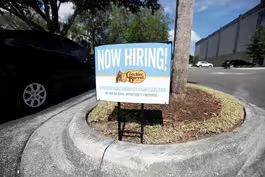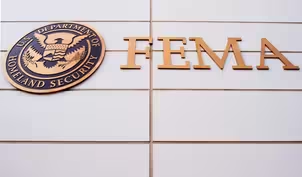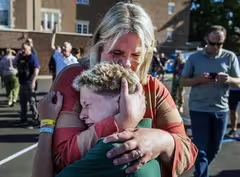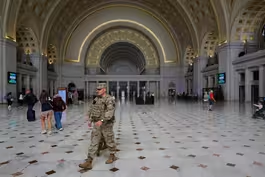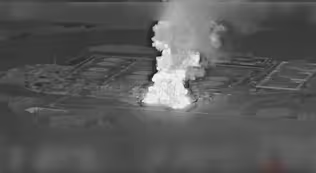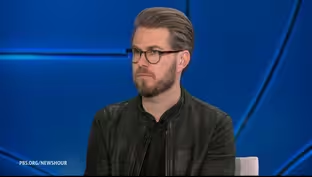
What Americans can learn from Northern Ireland's history
Clip: 8/27/2025 | 11m 31sVideo has Closed Captions
What Americans can learn from Northern Ireland's history of political violence
The United States is a deeply divided country awash in weapons, leading many to worry about escalating political violence and even a broader sectarian conflict. Judy Woodruff traveled to Northern Ireland, a place steeped in both political violence and the hope for peace, to find out what lessons we might learn from its experience. It's for her series, America at a Crossroads.
Problems playing video? | Closed Captioning Feedback
Problems playing video? | Closed Captioning Feedback
Major corporate funding for the PBS News Hour is provided by BDO, BNSF, Consumer Cellular, American Cruise Lines, and Raymond James. Funding for the PBS NewsHour Weekend is provided by...

What Americans can learn from Northern Ireland's history
Clip: 8/27/2025 | 11m 31sVideo has Closed Captions
The United States is a deeply divided country awash in weapons, leading many to worry about escalating political violence and even a broader sectarian conflict. Judy Woodruff traveled to Northern Ireland, a place steeped in both political violence and the hope for peace, to find out what lessons we might learn from its experience. It's for her series, America at a Crossroads.
Problems playing video? | Closed Captioning Feedback
How to Watch PBS News Hour
PBS News Hour is available to stream on pbs.org and the free PBS App, available on iPhone, Apple TV, Android TV, Android smartphones, Amazon Fire TV, Amazon Fire Tablet, Roku, Samsung Smart TV, and Vizio.
Providing Support for PBS.org
Learn Moreabout PBS online sponsorshipAMNA NAWAZ: The United States today is a deeply divided country awash in weapons, leading many to worry about escalating political violence and even a broader sectarian conflict.
For her series America at a Crossroads, Judy Woodruff recently traveled to a place steeped in both political violence and the hope for peace, Northern Ireland, to find out what lessons Americans might learn from its experience.
JUDY WOODRUFF: In the lush green hills of Downpatrick in the southeast of Northern Ireland, a group of American tourists recently walked among the ancient ruins of Inch Abbey, where English monks once lived.
A couple of miles away, they offered a prayer at the grave of st. Patrick, the Apostle of Ireland, himself a Briton, while, in the capital, Belfast, they were confronted by the far more recent history of division in the period known as the Troubles, the 30-year sectarian conflict between Catholics and Protestants that cleaved society in two.
MAN: In those days, there was gun battles every day of the week.
JUDY WOODRUFF: This group of American tourists were from First United Methodist Church of Winter Park in Florida.
ALAN MCBRIDE, WAVE Trauma Centre: Seething with anger about the injustice of what had happened.
JUDY WOODRUFF: And they had come to learn about this conflict from the people who lived through it.
WILLIAM MITCHELL, Former Loyalist Combatant: Still in my school uniform, I sworn allegiance to one of the most vicious armed groups at the time.
JUDY WOODRUFF: The harm it did.
LINDA MOLLOY, WAVE Trauma Centre: And the police know who killed my son and have done absolutely nothing about it.
JUDY WOODRUFF: And efforts to build and maintain its hard-won peace.
REV.
DAVID MILLER, Pastor, First United Methodist Church Winter Park: I'm concerned, greatly concerned about the polarization.
It seems like we can't have even dialogue in a lot of ways anymore.
JUDY WOODRUFF: First United Methodist Pastor David Miller said he sees parallels back home.
PASTOR DAVID MILLER: Our identity is becoming primary and divided.
We're certainly more polarized than we have been even five years ago.
JUDY WOODRUFF: You see a connection.
REV.
DAVID MILLER: I do see a connection.
JUDY WOODRUFF: A similarity.
REV.
DAVID MILLER: Yes, I think why choose to come here?
Well, because there are similarities.
That's why we want to look through this lens back in our own context.
REV.
GARY MASON, Rethinking Conflict: And I often say, in your context in the United States, how do you create spaces to hear the other person's perspective?
JUDY WOODRUFF: Their guide was another Methodist minister and psychologist, Gary Mason.
He grew up in Belfast during the Troubles and worked for decades to build peace at home before sharing those lessons with Israelis and Palestinians, Eastern Europeans, and, in more recent years, Americans.
He stressed that, once unleashed, the kind of sectarian conflict Northern Ireland lived through was very hard to stop.
REV.
GARY MASON: When I was a little boy in the late '60s, common wisdom of the day was, this will be over by Christmas.
They were wrong.
It ended up 30 years, and it was the longest operation in British military history and was very, very difficult to bring to an end.
JUDY WOODRUFF: The long conflict between Catholics, who wanted an independent, unified Ireland free of British rule, and Protestants, who wished to remain loyal to the United Kingdom, goes back centuries.
And even when the fight truly began is hotly contested.
The more recent period of violence, the Troubles, began in the late 1960s, when the low-simmering conflict boiled over.
REV.
GARY MASON: Those late '60s, early '70s, we can call it ethnic cleansing, but very, very quickly, people began to move into their own safe spaces.
And by the time we reached 1972, the worst year of the conflict, we had a terrorist incident every 40 minutes.
JUDY WOODRUFF: The fighting would drag on for roughly 30 years.
30 years with tens of thousands of shootings, armed robberies and bombings, more than 25,000 citizens locked up and more than 3,500 killed, all in a country of about 1.6 million people.
It wasn't until 1998 that the two sides, with outside help from U.S.
Senator George Mitchell and the Clinton administration, brokered the political compromise known as the Good Friday Agreement.
MAN: Yes, 71.12 percent.
(CHEERING) JUDY WOODRUFF: Widely approved by the Northern population in a referendum.
And yet, since 1998, many more walls have been built.
And, behind them, the trauma of the conflict has continued to play out.
Here in Belfast, the so-called peace walls that separate Catholic neighborhoods from Protestant are physical reminders of the violence and vision that can still be felt decades after the signing of the Good Friday Agreement that formally ended the conflict.
Many of the people who lived through the Troubles still struggle with that history and with how to move forward together, which may hold lessons for our own country.
REV.
GARY MASON: More than 4,000 people, Judy, to the ending of the conflict in 1998 have committed suicide because of conflict-related issues.
One in five ex-prisoners are drinking themselves to death.
So they're self-medicating with alcohol.
We have the highest dosage here in this tiny little space of Northern Ireland of antidepressants in Western Europe.
I think a key for any person in American leadership is to ensure that you never descend into political violence, as we did here.
The cost of that is absolutely incredible.
WILLIAM MITCHELL: And this is a photograph of my primary school football team.
More than half of them ended up as political prisoners.
JUDY WOODRUFF: As teenagers, William Mitchell and Gerry McConville joined opposing paramilitary groups.
GERRY MCCONVILLE, Former Irish Republican Combatant: I was about 10.
JUDY WOODRUFF: This was age -- about age 10.
GERRY MCCONVILLE: About age 10, and five of those under... JUDY WOODRUFF: Eventually, each spending many years in prison.
Despite once being sworn enemies, today, they call each other friends and colleagues.
And while they strongly disagree about the future of this place, whether it should remain part of the U.K. or unify with Ireland, they work together to build bridges between their respective communities.
WILLIAM MITCHELL: If you had asked me during my period of incarceration, tell me something you would never do, this would be one of the things I would have said at the time.
But things change.
I'm OK with people pursuing a different agenda than me, as long as they do it legally and democratically.
GERRY MCCONVILLE: You know, it's not popular sometimes within your own community.
People would say to you, you're sitting down with a loyalist or you're sitting down with the people who murdered my brother or whatever, and, likewise, I would acknowledge that on William's side.
But it's about giving leadership.
It's about saying, this is the way to do it.
This is the way forward.
We need to listen and understand the other person's point of view.
LINDA MOLLOY: Reluctantly, I rise, routine tasks now dull, dreary drudgery.
You are not here.
JUDY WOODRUFF: Linda Molloy is Catholic, and she shared a poem she wrote with the American group about her son John, who in 1996 was murdered at the age of 18 as he was walking home late one night.
LINDA MOLLOY: Welcome the night in my haven, close my eyes, look for your face.
You are not here.
JUDY WOODRUFF: His killers were never apprehended.
On the Shankill Road, a street synonymous with loyalty to Britain, Alan McBride's wife and father-in-law were killed in a bombing in 1993 when Catholic paramilitaries attacked their fish shop in an attempt to kill opposition forces who regularly met upstairs.
ALAN MCBRIDE, WAVE Trauma Centre: The bombers came in, left the bomb on the counter, and killed nine innocent people, including my father-in-law, my wife, and seven other people who just happened to be shopping.
JUDY WOODRUFF: Despite their deep wounds and different backgrounds, Molloy and McBride have become close friends, working for many years together at a trauma center called WAVE to help people on both sides deal with the past.
ALAN MCBRIDE: But you have no idea, really, of knowing just the people you touch and the people that they in turn will touch.
And I think, while Linda and I's story is one of sadness and hardship and hurt, the fact that we can be together, we can laugh, we can joke, we can present an image of Northern Ireland that is, look, here from two opposite sides of the community, but we're absolutely at one with what we want for the future.
LINDA MOLLOY: It's just like throwing a stone into the ocean and causing the ripples.
But the other part of it is remembering our loved ones as well.
I do these talks and things like that so that John is not forgotten.
The morning is crisp and dry, trudge through autumn leaves, field of crunch, register reds, golds and greens, and suddenly you are all around me.
JUDY WOODRUFF: Members of the Florida congregation were deeply moved by what they heard.
LINDSEY HEMINGWAY, First United Methodist Church Winter Park: I have young children.
And hearing the story of her losing her son, it's hard not to put yourself there and to think what that might be like, and for something like politics and... JUDY WOODRUFF: For his part, Gary Mason worries about the normalization of political violence he sees today in the United States, the fire set to Pennsylvania Governor Josh Shapiro's residence, the murder of a lawmaker in Minnesota, the assassination attempts on President Trump's life last year, the mass shootings in schools and churches and public spaces that have become routine, and overall the language of dehumanization he hears from our leaders.
REV.
GARY MASON: I was saying to both Republicans and Democrats, politics is about the healthy art of disagreement.
I mean, we know that.
But it's also important to understand, why did that person make those choices and why did they do that?
A theologian of another generation once said, dehumanization precedes genocide.
And the last thing a great country like the United States wants to do is to continue to demonize the other person.
Let's have a robust political debate, but remember where demonization leads to.
So, be careful would be my advice.
JUDY WOODRUFF: In a coming story, we will profile what the U.S. might learn from the work being done in Northern Ireland today to maintain the peace and to build a more integrated future.
MAN: Northern Ireland is now doing something I think uniquely special in this world, but they had to come through hell in order to get there.
Hopefully, we're wise enough to learn from that example and not have to go there in the first place.
JUDY WOODRUFF: For the "PBS News Hour," I'm Judy Woodruff in Belfast, Northern Ireland.
Cracker Barrel backlash reveals the power of branding
Video has Closed Captions
Clip: 8/27/2025 | 5m 44s | What the Cracker Barrel backlash reveals about the power of branding (5m 44s)
FEMA employees critical of Trump placed on leave
Video has Closed Captions
Clip: 8/27/2025 | 6m 37s | FEMA employees critical of Trump placed on leave amid crackdown on dissent (6m 37s)
Minneapolis mayor calls for action after school attack
Video has Closed Captions
Clip: 8/27/2025 | 11m 16s | 'We owe this to our children': Minneapolis mayor calls for action after school attack (11m 16s)
News Wrap: Feds taking control of D.C.'s Union Station
Video has Closed Captions
Clip: 8/27/2025 | 7m 14s | News Wrap: Trump administration taking over management of D.C.'s Union Station (7m 14s)
Russia, Ukraine target energy infrastructure as war persists
Video has Closed Captions
Clip: 8/27/2025 | 4m 7s | Russia and Ukraine target each other's energy infrastructure as war persists (4m 7s)
'Wake up,' Miles Taylor warns as Trump punishes opponents
Video has Closed Captions
Clip: 8/27/2025 | 6m 16s | Miles Taylor warns: 'We need America to wake up' as Trump punishes opponents (6m 16s)
Providing Support for PBS.org
Learn Moreabout PBS online sponsorshipSupport for PBS provided by:
Major corporate funding for the PBS News Hour is provided by BDO, BNSF, Consumer Cellular, American Cruise Lines, and Raymond James. Funding for the PBS NewsHour Weekend is provided by...
